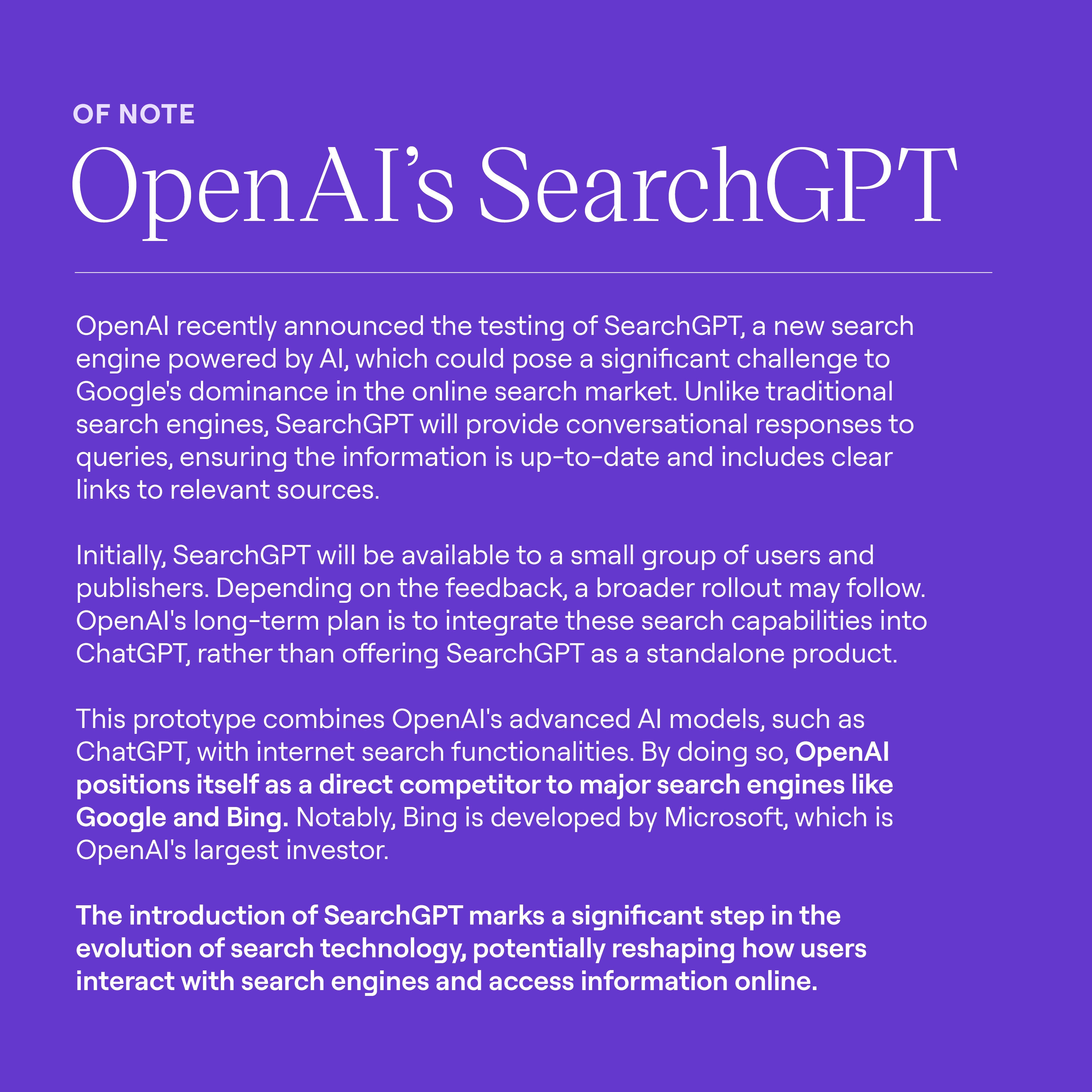August 15, 2024
How marketers can adapt to Google’s new AI-powered search results
Searched on Google lately?
Honestly, asking that question in 2024 to anyone with internet access in any country in which Google is available is like asking whether that same person has breathed in air lately.
Now more to the point: Noticed the new AI-powered search blurb at the top of most of Google’s searches? Yeah, that’s new, and it’s a gamechanger for marketers – especially as it relates to SEO and SEM. Let’s quickly unpack what the changes are and the impact they will have on SEO and SEM as they relate to brand marketing.
How Google is changing to incorporate AI into search results
In 2024, Google unveiled significant updates to its search engine, integrating advanced AI capabilities through the new Gemini model. This model enhances the search experience with multi-step reasoning, planning, and multimodal abilities, enabling more intuitive and efficient user interactions. One of the standout features is the introduction of AI Overviews. These overviews provide concise summaries of search topics, alongside links for more detailed exploration. The feature aims to streamline the search process by offering quick answers and reducing the need for users to piece together information from multiple sources.
Moreover, Google has introduced AI-organized results pages for specific queries related to dining, recipes, movies, music, books, hotels, shopping, and more. These pages leverage AI to help users brainstorm and explore ideas more effectively. By presenting a well-organized set of search results, the AI can answer complex queries on a single page, eliminating the need for multiple searches. For users participating in Search Labs, Google has enabled the ability to adjust AI Overviews to simplify language or provide more in-depth explanations, catering to different levels of user expertise.
The impact of those changes on SEO marketing
The integration of AI into Google's search engine has profound implications for SEO marketing. The introduction of AI Overviews means that users may find quick answers at the top of the search results page, potentially reducing the click-through rate for traditional organic search results. Marketers will need to reexamine and, in some cases, reimagine SEO strategies to place a greater emphasis on optimizing content to be featured and cited in these AI-generated summaries. Marketers must focus on creating high-quality, comprehensive content that addresses common user queries to increase the likelihood of being included in AI Overviews.
Furthermore, the AI-organized results pages prioritize relevance and user intent more effectively. SEO marketers will need to adapt by ensuring their content is highly relevant to user searches and optimized for the specific categories highlighted by AI, such as dining, recipes, and travel. This might involve more detailed keyword research and the creation of content that aligns closely with user intent and search behavior. The AI's ability to handle complex queries also suggests a growing importance of long-tail keywords and natural language processing in SEO strategies.
“Brands and marketers who invest in high-quality, relevant content that aligns with user intent and search behavior will likely see increased visibility and engagement. ”
The impact of the changes on brand marketing
For brand marketing, the AI enhancements in Google's search engine offer both opportunities and challenges. On the positive side, brands that produce high-quality, informative content are more likely to be featured in AI Overviews and AI-organized results pages. This can increase brand visibility and credibility, as users are exposed to the brand's content in a prominent position on the search results page. Brands should invest in creating authoritative and engaging content that addresses the specific needs and queries of their target audience. And, to do this, brands must first truly understand those specific needs and queries.
However, the increased prominence of AI-generated content may also mean that branded content appears less frequently in traditional organic search results. Brands will need to adapt by leveraging AI insights to understand user behavior and preferences better. This could involve using AI tools to analyze search trends, user engagement, and content performance to refine their marketing strategies. Additionally, brands might consider incorporating more interactive and multimedia content, such as videos and infographics, to engage users effectively and increase the chances of being featured in AI-organized results. Lastly, brands must investigate how effective their quantitatively driven customer segmentation is: Does it incorporate actual behaviors? An effective segmentation today must confirm that what customers say they want via traditional quant and qual research methods is married with what customers actually want and how they go about researching, considering and finally purchasing what they want.
Brands that naturally have some direct insight into their audiences’ behaviors will have a leg up here if they are mining that data and harvesting insights from it. Think of brands like Sirius XM and Spotify; they know what you listen to and for how long. Or brands like Target and Walmart; they know what you buy, when and in what quantity. If you’re not a brand with such a direct feed of data from your target audiences, see some tips below on how to mine SEM data to help you learn more about behaviors.
The impact the changes will have on SEM
Search Engine Marketing (SEM) has become a critical part of marketers' overall media strategies. It accounts for a substantial portion of the digital advertising budget, with estimates suggesting that paid search and display advertising make up around 22.5% of total advertising spend by 2024.
The integration of AI into Google's search engine will also impact Search Engine Marketing (SEM). With the advent of AI Overviews and AI-organized results pages, the placement and effectiveness of paid search ads may change. While ads will continue to appear in dedicated slots throughout the search results page, the prominence of AI-generated content might influence user click behavior. Advertisers will need to monitor these changes closely and adjust their bidding strategies and ad creatives to ensure they remain competitive.
Additionally, AI can enhance SEM by providing deeper insights into user intent and behavior. Advertisers can leverage these insights to create more targeted and relevant ad campaigns. For instance, understanding the specific queries that trigger AI Overviews can help advertisers develop ads that address these queries directly, increasing the likelihood of user engagement. The ability to analyze complex search patterns and trends using AI can also inform better budget allocation and campaign optimization strategies.
Winners and losers in this new normal of AI-led search
In the new AI-led search landscape, the winners will be those who can effectively adapt their SEO, brand marketing, and SEM strategies to leverage AI's capabilities. Brands and marketers who invest in high-quality, relevant content that aligns with user intent and search behavior will likely see increased visibility and engagement. The ability to use AI tools to gain insights into user preferences and optimize marketing strategies will also be a key factor in success.
Conversely, those who fail to adapt may find it challenging to maintain their visibility and effectiveness in search results. Traditional SEO practices that do not account for AI's impact on search behavior and results may become less effective. Brands that rely heavily on paid search ads without adjusting their strategies to account for AI-generated content may also see a decline in ad performance. Additionally, brands must remain flexible and in a state of continuous learning as Google will likely continue to adjust and shift how it uses AI-powered search results.
Overall, the integration of AI into Google's search engine represents a significant shift in how search works, offering both opportunities and challenges for marketers. By understanding and leveraging these changes, businesses can navigate the new AI-led search environment and achieve greater success in their digital marketing efforts.







